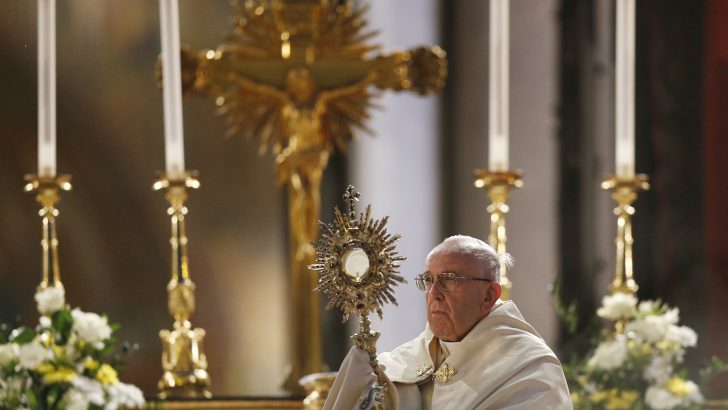We are a week on from a decision that has changed Ireland forever. I recognise the possibility that you may be saying, “please, no, we have had enough, let’s talk about something else” and yet the reality is that the time for talking has only begun.
This weekend we celebrate the Feast of Corpus Christi – the most holy Body and Blood of Christ. It is a time to reflect on the importance and meaning of the Eucharist in our lives.
It is also a time to reflect on our deepest identity as Christians and Catholics – that we are the body of Christ.
What does it mean to say that we are the body of Christ at a time when many are feeling bruised and battered by the events of recent months? Families and friends have stood on differing sides of the referendum debate. Many have felt shocked and isolated when they realised the voting intentions of people close to them. There is a lot of hurt and desolation.
We are faced with the reality that soon Ireland will become a place where a baby can be aborted for any reason at all up until 12 weeks in the womb. It will become clear in the coming months how available abortion will be even up to six months. A door has been opened which we cannot shut. Those who voted ‘Yes’ for reasons of ‘compassion’, ‘choice’ and ‘personal autonomy’ may find themselves overwhelmed with regret when the scale of abortion provision becomes apparent.
Situation
So, what do we do? We could retreat, condemn what has happened and wait for the opportunity to say, ‘I told you so’. Or we could engage even though at this moment that feels like the hardest thing. The reality is we cannot wash our hands of this situation. We need to continue to proclaim the gospel of life. When abortion is legalised, it becomes normalised. Within family life and within our wider communities we need to resist that process.
We need to recommit to raising a generation of young people who believe in the sanctity of life. To do that we need to open up some fairly challenging conversations, about sex, relationships and responsibility. There is talk about introducing sex education programmes in schools which put a lot of emphasis on consent but are disconnected from the ethos of the schools. If that succeeds, then it becomes more important than ever that ethos and values are coming from the home.
Consent
It is not enough to insist that young people understand the concept of consent, important though that is. As a mother and as a Catholic I want my own children to see sex as something wonderful and powerful within a committed, covenant relationship where a pregnancy is not seen as a crisis but as the expression of the love between two people.
We need to equip our young people with the resilience to withstand a culture that tells them sex is free and easy. We need them to take with them out into the world a message that sexual pleasure comes with moral and social responsibility.
As families, faith communities and as society we need to make sure there are better options than abortion for women. As a family and as parishes we need to be open and welcoming so that women in difficulty can come and talk to us and receive support.
Are we prepared to commit resources so that our parishes and dioceses can provide pastoral care for women in crisis? Will we advocate for and support the development of perinatal hospice care to support families whose baby is diagnosed with a potentially life-limiting condition? It is not an option for us as Christians to announce, “well I voted no” and walk away. We need to be involved in creating better options for women.
We need to keep the lines of communication open. We need to proclaim the gospel of life.


 Bairbre Cahill
Bairbre Cahill Pope Francis leads Benediction outside the Basilica of St. Mary Major on the feast of Corpus Christi in Rome in 2016.
Pope Francis leads Benediction outside the Basilica of St. Mary Major on the feast of Corpus Christi in Rome in 2016.